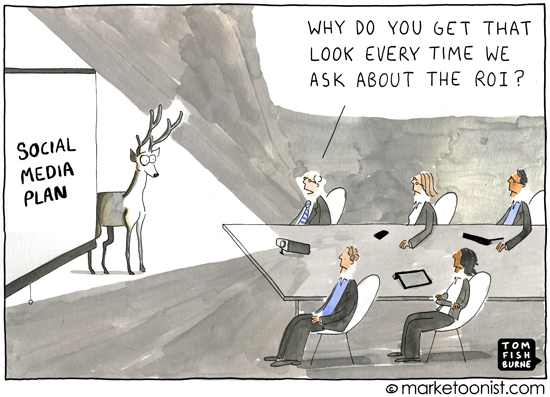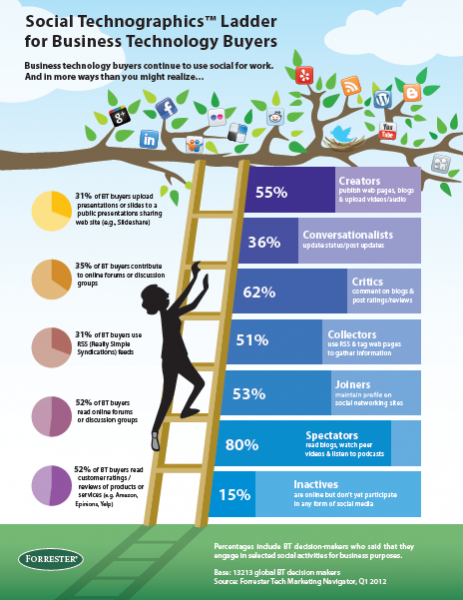 Marketing trends come and go, but what other ?shiny object? topic has caused more debate than social media?
Marketing trends come and go, but what other ?shiny object? topic has caused more debate than social media?
On the one hand, recent studies?cited by eMarketer show that two thirds of the U.S. internet population will belong to a social network by 2013. On the other hand, a study by Harvard Business Review showed that?29% of the 2,100 organizations surveyed felt it was difficult to see the benefit of social media for their business purposes.
It?s true that with something as large, fast changing and ubiquitous as the social web there will be zealots and dissenters as well as the comfortably numb. The fact that opportunists make unsubstantiated claims as self-anointed?social media experts doesn?t help matters when it comes to understanding social fact from fiction.
The ease of publishing makes it nearly impossible to catalog the sheer volume of myths about social media marketing, but since this series is a preview of my NMX BusinessNext presentation, I?ll focus on the following three:
Myth 1: ?Social Media Will Replace Search Engines
Many companies create and maintain a competitive advantage by staying on top of trends. Looking at technology as well as consumer behaviors, the growth of social influence is irrefutable. The adoption of social media use on computers, tablets and mobile devices has made it a?ubiquitous?part of the consumer digital experience. By the year 2020, Ericsson predicts there will be over 50 billion connected devices.
Between the rising growth of social media adoption, slowed growth in search usage and the integration of social into core search, surely all that connectedness means search engines will give way to social networks as primary sources of information for consumers and business buyers?
Just look at Google trends for news topics and you?ll see compelling evidence of interest in ?social media? eclipsing ?search engines? in 2011.

Myth Busted:? You can pick any stats you want to support a position. A Pew Research study reports that while social is rising fast,?email and search engines?are the most popular activities online. Many ?social beats search? advocates feel that social and search are mutually exclusive and get caught up in generic statistics vs. what?s important to brands and marketers: the buyer and their experience with brand information discovery, consumption and engagement. ?Simply looking at web analytics and the touchpoints in the buyer?s journey reveals interactions with a number of channels before purchase: email, advertising, search, social, 3rd party media, referrals.
Here?s a situation most people can relate to: Imagine asking friends on a social network for restaurant recommendations. Do you go to the restaurant from that or do you go to a search engine like Google or Bing to find out where the restaurant is, the hours, the menu, what it looks like and reviews? When you visit the restaurant you might check in on Foursquare and then post photos from Instagram. You might even write a review on Yelp. You may even go back to the social network where the restaurant was recommended and share what a good (or bad) suggestion it was.
With B2B buyers this journey might be extended over weeks or months of information gathering, consumption and for the good stuff, sharing. Search and social work together to surface useful information to buyers and consumers. One by no means, replaces the other.
Yes social is integrated with how search engines work and I don?t see that ever changing. But the act of searching is an explicit indication of intent and can drive people ready to buy to credible, useful information. You might like your friends, and they may even know your interests well, but are they really capable of making the best recommendations at the time you need them? While search engines are not perfect, 12 billion people search Google alone on a monthly basis, trusting the search results to provide useful information, 24/7.
The competitive marketing advantage comes from a focus on the buyer and how they use search and social, not by focusing on one or the other.
Myth 2: ?Social Has No ROI or is Too Difficult to Measure
?We?ve been running a Twitter account for 6 months and haven?t had any sales. Social media is a waste of time.? Sound familiar?
Companies have spent billions of dollars over the past 5 years and the consensus amongst many marketers is that social media has not had a direct impact on growing sales. While 9 out of 10 companies will market on the social web this year, most companies are not able to measure anything more than ?engagement?. In fact, a study by Adobe and Econsultancy?(pdf) reported that only 12% of companies can tie their social media efforts to bottom line impact on revenue.

Myth Busted: While it has been an ongoing challenge to connect social media efforts to ROI, companies are increasingly reporting such connections and increasing social media investments accordingly. In a study reported by eMarketer, ?Two-thirds of B2C marketers (67%) said they had generated leads from Facebook, and 39% said they saw sales as a result of outreach on the site.? ?Indeed, it has been a challenge but web analytics services like Google Analytics have added features to better support social media measurement.
Aside from the mechanics of social media ROI measurement, of which resources are abundant, I think there?s another consideration when understanding the business value of the social web. I touched on some of this in ?What?s the ROI of Corporate Blogging??.
There?s a major shift in perspective necessary to really understand the value of the social web. This is bigger than a marketing channel or campaign. Social media is a platform on par or even bigger than things like email or telephones. The effect for brands being present and useful on the social web is increasingly influencing direct sales but also acts as an assist.
People buy because they like you. Brands can get to know their customers and become ?likeable? by being useful through social networks and media sharing sites. ?The notion of customer journey is really important here because marketers that understand how people discover, consume and engage with content will be able to create and optimize performance of social, search or whatever tactics are in the mix. The buyer journey is not linear and the social web intersects with nearly every other digital channel where a brand presence is valuable.
The business value of social participation does rely on the mechanics of measurement, but more importantly, it relies on the intent of the brand. How the brand uses their social media presence to create value, capture insight, grow a community and influence buyers along the sales cycle are the key to social media ROI.
Myth 3:?My B2B Customers Are Not on the Social Web
Over the past 5+ years I?ve heard more than a few B2B company marketers say that their customers are, ?Not on Facebook, Not on Twitter, Not watching YouTube, Not on Pinterest? and so on. ?They say sales people never mention that clients decided to look up enterprise CRM software with their aunts, uncles and cousins on Facebook, so clearly, customers aren?t there. ?Marketing says competitors don?t have a Facebook page and rarely post to a company blog, so clearly prospects are not there. The CEO, and CMO are not active on the social web and they represent the ideal prospect for this B2B company. Again, a vote of no confidence for B2B buyers sourcing resources via the social web.

Myth Busted: ??B?s are people too. The B2B buyer?experiences?a much longer sales cycle of information discovery, consumption and evaluation. Sourcing new products and servies relies on more than search and extends to business connections on social networks like LinkedIn. IBM has a classic example of ?Listening for Leads? on forums, Twitter and public social networks for buying signals then reaching out to help. That social sales prospecting effort generated millions of new revenue.
There are many other sources to support the influence of social media on B2B sales and marketing effectiveness. LinkedIn shared an infographic outlining the influence of social media on IT decisions for B2B. 85% of IT decision makers use social media for business and 3 out of 5 said social media influenced their purchasing decision. A recent Demand Gen Report B2B Buyer Survey reports that 50% of B2B buyers say social media plays a major role in purchasing decisions and 53% use social media to follow discussion on the vendors they are considering. According to SiriusDecisions,?67% of the buyer?s journey is now done digitally. Much of that journey is fueled with content that is discovered, consumed and shared on the social web.
B2B influence is not limited to email, conferences and white papers. The social web is ubiquitous for how buyers research credible sources of information and vendors. The only question is, when they do that research, will they be informed and guided through the sales process by your company?s social media content or your competitors?
This post is the second in a three part series?where I?ll touch on common myths that are polluting perceptions of incredibly effective marketing tactics like content marketing, SEO and Social Media. The third post about myth-busting SEO will publish in Dec 26th.
This series is a preview to my presentation at the NMX?conference (BlogWorld) on January 8th (Tuesday) at the Rio in Las Vegas.?Here?s the official session description:
War of Words:?Myth-Busting?Social, SEO & Content
This just in: ?SEO is Dead?, ?There is no ROI in Social Media? and many other proclamations are made in industry press and on blogs just about every week. And yet investment in social, search and content are all on the rise. Why the disconnect? From pageview journalism to egomaniacal SEO superstar wannabe?s, sweeping generalizations and out of context observations have created a number of myths about these highly effective online marketing channels.
This presentation will identify and bust the most common myths about SEO, Social Media and Content Marketing plus provide attendees with examples of how an integrated approach will win the battle and the war for more customers, better engagement and online marketing success.
Takeaways:
- Distinguish fact from fiction about social, SEO and Content Marketing
- Discover a model for integration that gets results
- See examples of modern social, SEO & content in action
A free copy of?Optimize?will be given to the top 2 people who livetweet the presentation. ?I hope to see you there! (Registration info?and code for $200 off)
What are some of the biggest ?myths? you?ve heard about social media marketing? Any suggestions for myth-busting about content marketing or SEO?
Source: http://www.toprankblog.com/2012/12/myth-busting-social-media-marketing/
No comments:
Post a Comment